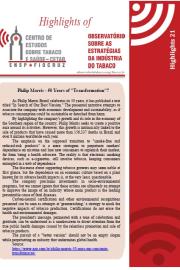
Highlights with topics considered important with the aim of promoting debates and decision-making in the field of tobacco control. In this edition, the agenda is about: Philip Morris - 50 Years of "Transformation"?; Postponement of COP10 and MOP3; Challenges in Tobacco Diversification; Demystifying the Tobacco Industry and Smoking ESG: The Tobacco Industry and the reality behind the Curtain.
KORNALEWSKI, Alex Medeiros; CARVALHO, Alexandre Octavio Ribeiro de; BARATA, Danielle; HASSELMANN, Luis Guilherme; TURCI, Silvana Rubano. Destaques do Observatório sobre as Estratégias da Indústria do Tabaco. Cetab/Ensp/Fiocruz, Rio de Janeiro, nov. 2023. Acesso em: 24 nov. 2023.
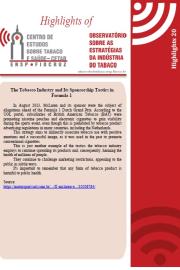
Highlights with topics considered important with the aim of promoting debates and decision-making in the field of tobacco control. In this edition, the agenda covers: the tobacco industry and its tactics for sponsorship in Formula 1; the tobacco mafia; Public Hearing: release of electronic cigarettes in Brazil; facts about the UK tobacco strategy.
KORNALEWSKI, Alex Medeiros; CARVALHO, Alexandre Octavio Ribeiro de; BARATA, Danielle; HASSELMANN, Luis Guilherme; TURCI, Silvana Rubano. Destaques do Observatório sobre as Estratégias da Indústria do Tabaco. Cetab/Ensp/Fiocruz, Rio de Janeiro, out. 2023. Acesso em: 20 out. 2023.
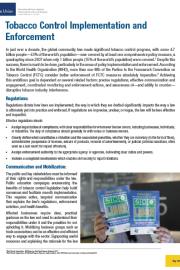
In just over a decade, the global community has made significant tobacco control progress, with some 4.7 billion people—63% of the world’s population—now covered by at least one comprehensive policy measure, a quadrupling since 2007 when only 1 billion people (15% of the world’s population) were covered.1 Despite this success, there is much to be done, particularly in the areas of policy implementation and enforcement. According to the World Health Organization (WHO), more than one-fifth of the Parties to the Framework Convention on Tobacco Control (FCTC) consider better enforcement of FCTC measures absolutely imperative.2 Achieving this ambitious goal is dependent on several related factors: precise regulations, effective communication and engagement, coordinated monitoring and enforcement actions, and awareness of—and ability to counter— disruptive tobacco industry interference.
TOBACCO Control Implementation and Enforcement. The Union, [s.l.], May, 2022. 4p.

Em pouco mais de uma década, a comunidade global fez progressos significativos no controle do tabaco, com cerca de 4,7 bilhões de pessoas – 63% da população mundial – agora cobertas por pelo menos uma medida política abrangente, um quadruplicando desde 2007, quando apenas 1 bilhão de pessoas (15% da população mundial) estavam cobertas.1 Apesar disso, sucesso, há muito a ser feito, particularmente nas áreas de implementação e aplicação de políticas. De acordo com à Organização Mundial da Saúde (OMS), mais de um quinto das Partes da Convenção-Quadro sobre O Controle do Tabaco (FCTC) considera absolutamente imperativa uma melhor aplicação das medidas da FCTC.2 Alcançar este objetivo ambicioso depende de vários fatores relacionados: regulamentos precisos, comunicação eficaz e engajamento, monitoramento coordenado e ações de fiscalização, e conscientização – e capacidade de combater – interferência disruptiva da indústria do tabaco.
TOBACCO Control Implementation and Enforcement. The Union, [s.l.], May, 2022. 4p.
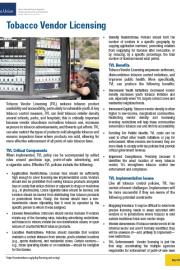
Tobacco Vendor Licensing (TVL) reduces tobacco product availability and accessibility, particularly to vulnerable youth. A key tobacco control measure, TVL can limit tobacco retailer density around schools, parks, and hospitals; this is critically important because vendor abundance normalizes tobacco use, increases exposure to tobacco advertisements, and thwarts quit efforts. TVL can also restrict the types of products sold alongside tobacco and ensures inspectors know where products are sold, allowing for more effective enforcement of all point-of-sale tobacco laws.
TOBACCO Vendor Licensing. The Union, [s.l.], May, 2022. 2p.
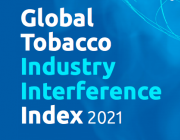
Enquanto os governos têm o poder de restringir regulamentos da indústria, infelizmente, o oposto parece ter acontecido nestes tempos difíceis. No muitos países, os governos têm protegido e até promoveu a TI. O tabaco já é o responsável por cerca de 8 milhões de mortes anuais em todo o mundo1 e saúde e as perdas de produtividade custam cerca de US $ 1,4 trilhão todos os anos. No entanto, os governos foram persuadidos a acomodar as demandas e lobby deste prejudicial indústria e aceitar sua caridade, conforme mostrado no Global Índice de Interferência da Indústria do Tabaco 2021 (o Índice).
GLOBAL Tobacco Industry Interference Index 2021. Global Center for Good Governance in Tobacco Control, Thialand, 2021, nov. 2021. 72p.
After more than a decade of pressure from increasing government tobacco controls, a growing illicit cigarette economy and changing consumer attitudes towards smoking, South Africa's Tobacco industry was subjected to a twenty-week prohibition on the sale of all raw tobacco leaf, processed tobacco and all manufactured tobacco products under lockdown measures. This led to the industry losing significant market share to illicit cigarette sales. The industry also faced an 8% increase in excise duties and announcements of renewed government efforts to finalise further tobacco controls.
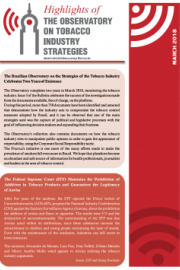
Highlights with topics considered prominent in order to promote debates and decision-making in the scope of tobacco control. In this edition, the following points are presented: Observatory on Tobacco Industry Strategies celebrates two years of industry monitoring; STF maintains prohibition of additives in tobacco products and guarantees Anvisa's legitimacy; Anvisa approves new rules for cigarette exposure at sales outlets; Sead's budget cut puts the tobacco diversification program at risk.
KORNALEWSKI, Alex Medeiros; CARVALHO, Alexandre Octavio Ribeiro de; BARATA, Danielle; LEONEL, Filipe; TURCI, Silvana Rubano. Destaques do Observatório sobre as Estratégias da Indústria do Tabaco. Cetab/Ensp/Fiocruz, Rio de Janeiro, jul. 2018. Acesso em: 25 jul. 2018.
Introduction: Nepal passed a comprehensive tobacco control law in 2011. Tobacco control advocates successfully countered tobacco industry (TI) interference to force implementation of law.
Aims and Methods: Policy documents, news stories, and key informant interviews were triangulated and interpreted using the Policy Dystopia Model (PDM).
Results: The TI tried to block and weaken the law after Parliament passed it. Tobacco control advocates used litigation to force implementation of the law while the TI used litigation in an effort to block implementation. The TI argued that tobacco was socially and economically important, and used front groups to weaken the law. Tobacco control advocates mobilized the media, launched public awareness campaigns, educated the legislature, utilized lawsuits, and monitored TI activities to successfully counter TI opposition.
Conclusions: Both tobacco control advocates and the industry used the discursive and instrumental strategies described in the PDM. The model was helpful for understanding TI activities in Nepal and could be applied to other low- and middle-income countries. Civil society, with the help of international health groups, should continue to track TI interference and learn the lessons from other countries to proactively to counter it.
Implications: The PDM provides an effective framework to understand battles over implementation of a strong tobacco control law in Nepal, a low- and middle-income country. The TI applied discursive and instrumental strategies in Nepal in its efforts to weaken and delay the implementation of the law at every stage of implementation. It is important to continuously monitor TI activities and learn lessons from other countries, as the industry often employ the same strategies globally. Tobacco control advocates utilized domestic litigation, media advocacy, and engaged with legislators, politicians, and other stakeholders to implement a strong tobacco control law. Other low- and middle-income countries can adapt these lessons from Nepal to achieve effective implementation of their laws.
BHATTA, D. N. et al. Defending comprehensive tobacco control policy implementation in Nepal from tobacco industry interference (2011-2018). Nicotine & Tobacco Research: Official Journal of the Society for Research on Nicotine and Tobacco, Reino Unido, v. xx, n. xx, p. 1-10, abr. 2020.
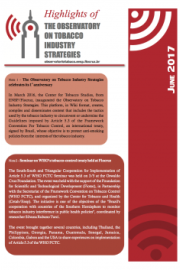
Highlights with topics considered prominent in order to promote debates and decision-making in the scope of tobacco control. In this edition, the following subjects are presented: one-year anniversary of the Observatory on Strategies of the Tobacco Industry; Seminar on WHO's anti-smoking treaty is held at Fiocruz; Dissemination of the Center of Studies on Tobacco and Health’s (Cetab) bulletin on actions to protect public policies against the interests of the tobacco industry, and World No Tobacco Day 2017 warns of the damage to development caused by tobacco production.
KORNALEWSKI, Alex Medeiros; CARVALHO, Daniel da Costa e Silva de; BARATA, Danielle; LEONEL, Filipe; TURCI, Silvana Rubano. Destaques do Observatório sobre as Estratégias da Indústria do Tabaco. Cetab/Ensp/Fiocruz, Rio de Janeiro, mai. 2017. Acesso em: 13 jul. 2017.